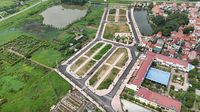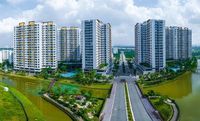Vietnam's real estate market is showing signs of growth as it enters the second quarter of 2025, according to the latest data from Batdongsan.com.vn. The market has experienced stable selling price growth, although there has been a slight decline in search demand since late 2024. Notably, both land plots and apartments have seen increased search volumes in the first quarter of 2025.
In March 2025, the search volume for apartments rose by 13% compared to February, with listings on the platform increasing by 20% in Hanoi and 30% in Ho Chi Minh City. The average selling price for apartments has continued to climb, reaching 63 million VND per square meter in Hanoi and 59 million VND per square meter in Ho Chi Minh City. Rental yields have, however, seen a decline, dropping from over 4% in Q1 2023 to 2.8% in Q1 2025.
According to Đinh Minh Tuấn, the Southern Regional Director of Batdongsan.com.vn, the data highlights significant trends in the apartment market. For instance, in Hanoi, the average selling price for apartments located 30 to 60 minutes from the city center ranges from 40 to 80 million VND per square meter, with some projects reaching up to 100 million VND per square meter. For those located further away, prices typically fall between 20 and 50 million VND per square meter.
In contrast, apartment prices in Ho Chi Minh City show less variation between the city center and the suburbs, primarily ranging from 30 to 60 million VND per square meter, with a few listings approaching 100 million VND per square meter. New supply in Hanoi during Q1 2025 has largely focused on high-end and luxury segments in suburban districts, while Ho Chi Minh City’s new apartment supply has been more diverse.
In a broader context, Vietnam's GDP is estimated to have grown by 6.9% in Q1 2025, marking the highest growth rate compared to the same period in previous years. Foreign Direct Investment (FDI) reached 11 billion USD during the same quarter, reflecting strong international investor confidence in Vietnam's economic environment. Furthermore, the country welcomed 6 million international visitors in the first quarter, which has boosted the real estate market, particularly in tourism and resort sectors.
Despite facing challenges, including a significant increase in U.S. import taxes from 4.6% to 50.6%, the temporary suspension of these taxes for 90 days and a subsequent adjustment to 14.6% has alleviated market anxieties. This development has reinforced investor confidence in the stability of policies in the medium term, providing room for continued investment in industrial real estate and related supply chains.
One notable factor influencing investor sentiment in Q1 2025 has been the discussion surrounding provincial mergers. Data from Batdongsan.com.vn indicates a marked increase in interest for real estate in provinces that share geographical similarities or complementary development potential. For example, interest levels surged in Da Nang (39%), Quang Nam (96%), Hung Yen (36%), and Thai Binh (75%). The infrastructure and connectivity improvements in these areas have positioned them as new hotspots for investment.
However, lessons from the Hanoi-Ha Tay merger between 2016 and 2025 highlight the importance of synchronized planning. During that period, real estate prices in Ha Tay increased dramatically, but many projects faced delays or were left abandoned due to poor planning. This underscores that sustainable price increases depend on a combination of local economic development, improved investment environments, and effective management capabilities.
Nguyễn Quốc Anh, Deputy General Director of Batdongsan.com.vn, advised investors to remain vigilant and avoid a speculative mentality. Instead, they should focus on data-driven decisions and targeted regional strategies. The real estate market in 2025 is also benefiting from significant momentum from housing policies and social housing initiatives. The target of developing 1 million social housing units has seen positive outcomes, with hundreds of thousands of units currently being completed or approved for investment.
Notably, Decree 100 has expanded the rights of social housing buyers, and mortgage interest rates are trending downwards. Many banks have introduced special loan packages aimed at young buyers, which are expected to stimulate genuine housing demand and support market liquidity recovery.
Surveys conducted by Batdongsan.com.vn reveal that 67.1% of brokers anticipate a loosening of credit policies, while 47.9% hope for reduced taxes and transaction fees, and 43.4% wish for expedited legal procedures. These sentiments reflect the market's overall optimism for a new growth cycle.
As for land plots, they continue to attract strong interest, particularly in Hanoi, where search volumes increased by 52% in March 2025. In Ho Chi Minh City, the increase was 31%, with other provinces seeing a 54% rise. Selling prices for land plots have also surged, especially in the North, where areas like Hung Yen (75%), Bac Giang (80%), and Hai Duong (100%) have recorded impressive growth.
In the South, prices have remained more stable, with increases of 30% in Dong Nai and 25% in Binh Duong. Coastal land plots in Quang Nam, adjacent to Da Nang, have also seen heightened interest and rising prices, underscoring the potential in regions with natural and tourism advantages.
Overall, Q1 2025 paints a picture of a recovering real estate market in Vietnam, characterized by positive signals, albeit with uneven developments across regions and segments. This growing polarization necessitates that investors maintain a long-term perspective, continuously update their market data, and adopt flexible strategies. With a stable economic foundation, open credit policies, and strong growth potential in transitioning areas, the real estate sector in 2025 is poised for a breakthrough for those who can see beyond the immediate horizon, make informed choices, and act promptly.





